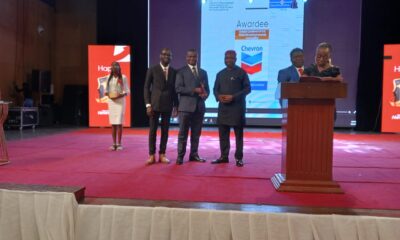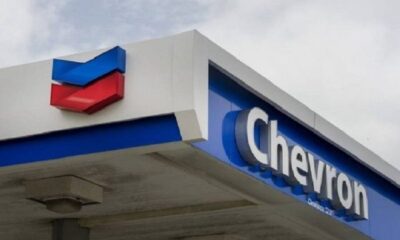Business
WED 2024: CNL’s Commitment To Sustainability, Restoration

Since 1973, June 5 every year has been celebrated as World Environment Day (“WED”); a day set aside to raise awareness and promote actions to address environmental issues including marine pollution, overpopulation, global warming, sustainable development, wildlife crime, among others.
The focus for this year is on land restoration, desertification and drought resilience under the slogan “Our land. Our future. We are #GenerationRestoration.”
Chevron Nigeria Limited (“CNL”), operator of the joint venture between the Nigerian National Petroleum Company Limited and CNL, identifies with this global action as it aligns with our commitment to protecting the environment while providing affordable, reliable, and ever-cleaner energy that enables human progress.
CNL’s operations are conducted with sound environmental management practices in compliance with all applicable laws and regulatory requirements, stakeholder expectations and best industry practices.
This commitment to environmental stewardship, is a key part of CNL’s Operational Excellence integral to project planning and assets life cycle management.
CNL places the highest priority on the safety of the people and the environment in its areas of operation.
Jim Swartz, CNL’s Chairman and Managing Director (“CMD”), explains that the theme for the year is consistent with the company’s values and environmental principles anchored on considering the environment in decision making, minimizing environment footprint, operating responsibly, and stewarding our sites. “We take proactive measures to prevent negative environmental impacts when we do every task or plan projects. We identify and manage risks to the environment and reduce potential environmental impacts throughout the life of our assets.”
Jim speaks further on the company’s focus on environmental stewardship, “We protect the environment through responsible design, development, operations and improve the integrity and reliability of our systems. We work to decommission, remediate
and reclaim applicable sites, following environmental procedures and best practices.”
The CMD also affirms CNL’ s dedication to achieving world class environmental excellence through its risk management process. We apply our Environment Risk Management process to identify, assess, mitigate, and manage environmental, community health, and social risks related to our operations, he said.
“We also conduct regular environmental monitoring of the biodiversity in our onshore, offshore, and deep-water areas, including vegetation, wildlife, fishery, and marine mammals. We use a risk-based approach to manage water and biodiversity risks throughout the life-cycle of our assets and business.
Esimaje Brikinn, General Manager, Policy, Government and Public Affairs said the company also partners with local communities in its areas of operation to raise awareness and cooperation in implementing environmental sustainability actions.
According to him, CNL’s waste management philosophy covers the entire life cycle of waste and ensures that all the wastes generated from its operations are managed responsibly from cradle to grave, applying its third-party Waste Stewardship process as applicable.
Esimaje cites the company’s mangrove restoration program to demonstrate its dedication to environmental stewardship and proactive approach to addressing the challenges of ecosystem restoration in the Niger Delta. “As part of our restoration efforts, we successfully restored approximately 18 hectares of land at different sites in our Western Area of operations which suffered fire incidents due to third party interference. The mangrove restoration also enabled CNL to impact the community positively through training of community women on identification of viable mangrove propagules, raising them in the nursery for transplanting of thousands of mangrove seedlings.”
CNL, he added, continues to demonstrate its commitment to environmental stewardship through its lower carbon strategy, focused on lowering the carbon intensity of its operations by implementing methane detection and reduction capabilities. This has enabled CNL to reduce routine gas flaring by over 97% in its operations in the past 10 years, showing its environmental responsibility.
As a corporate member of the Nigerian Environmental Society, CNL promotes the engagement and commitment to environmental protection actions in Nigeria. In 1992, the company, in partnership with the Nigerian Conservation Foundation (“NCF”), established the Lekki Conservation Centre, as a center of excellence in environmental research and education, which is also reserved as a sanctuary for the rich flora and fauna of the Lekki Peninsula.
Other initiatives include its support for the yearly postgraduate research grants for two PhD students in environment and conservation, instituted by the NCF; the annual S.L. Edu Memorial Lecture to promote environmental management awareness, and partnership with the Lagos State Government and NCF to sponsor the annual Walk for Nature event to create awareness for nature conservation and environmental issues.
According to Esimaje, “CNL’s efforts in environmental stewardship have continued to be recognized and applauded in the Nigerian oil and gas industry. CNL has a long history of working in collaboration with regulators and relevant stakeholders to identify and protect biodiversity in its areas of operation.”
As the world focuses on restoring land, preventing desertification, and coping with drought, CNL remains focused on its environment strategy “to further our ability to help protect and enhance biodiversity, manage waste generation and circularity, reduce air emissions, manage water resources and manage asset retirement requirements,” says Jim Swartz.
Business
Savannah Energy Provides Unaudited FY 2024 Trading Updates

Savannah Energy has shared a trading update on its Nigerian operations and other markets in Africa, including up-to-date cash collections in its Nigerian business.
According to the update, made available on Thursday in Lagos, its gross production in Nigeria averaged 23.1 Kboepd for FY 2024, broadly in line with the prior year’s 23.6 Kboepd, of which 88% was gas (FY 2023: 91%).
On the update, CEO of Savannah Energy, Andrew Knott, said, “I am pleased to provide a FY trading update which demonstrates the continued progress we have made in 2024, a year which saw the highest level of cash collections ever recorded by our Nigerian business. 2025 is expected to be an exciting year for our Company: we have a large planned operational programme in Nigeria which is anticipated to enhance both our oil and gas production levels and capacity; we intend to progress our R3 East oil development project in Niger; we continue to pursue key acquisitions in the upstream oil and gas space; and we continue to seek to build our power business.
“Fundamentally, Savannah remains unequivocally an “AND” company, seeking to deliver strong performance both for the short AND long term across multiple fronts, and pursuing growth opportunities in both the hydrocarbon AND power sectors.”
The update It also shows that it generated a Total Income of US$393.6 million in 2024, compared to FY 2023’s US$289.8 million. This consists of Total Revenues of US$258.7 million and Other operating income of US$134.9 million.
The report also shows that Savannah’s FY 2024 Total Revenues were ahead of the previously issued financial guidance of greater than US$245 million, while FY 2024 financial guidance is reiterated for Operating expenses plus administrative expenses at ‘up to US$75 million’. The company expects its FY 2024 capital expenditure to come in lower than planned (previously guided at ‘up to US$50 million’) due to the phasing of spend.
ALSO READ: CSR: Dangote Awards Scholarships To 473 Students
According to the update, Savannah’s cash collections in 2024 amounted to US$248.5 million, a slight increase from the US$206 million it received in 2023. The report further shows that its cash balances as at 31 December 2024 stood at US$32.6 million, compared to the 31 December 2023 figure of US$107.0 million.
The report shows that the company’s midstream subsidiary, Accugas Limited, had as at 31 December 2024 drawn down on its NGN332 billion of the NGN Transitional Facility, with the resulting funds being converted to US$, which, along with cash held, was used to partially prepay the existing Accugas US$ Facility, leaving a balance as at 31 December 2024 of approximately US$212.3 million.
The report also provided new updates on Accugas’ US$45 million Uquo Central Processing Facility (“Uquo CPF”) compression project in Nigeria, noting that its commissioning which will enable the expansion of gas production in the medium term is well underway.
The report highlighted the progress being made in the procurement process of long lead equipment in Nigeria for a potential two-well drilling campaign on the Uquo Field in H2 2025, with an additional gas development well expected to add up to 80 MMscfpd of supplemental production capacity and a potential exploration well targeting an Unrisked Gross gas initially in place (“GIIP”) of 154 Bscf (25.7 MMboe) of incremental gas resources.
The update shows that progress is also being made in the planned Savannah acquisition of Sinopec International Petroleum Exploration and Production Company Nigeria Limited, whose principal asset is a 49% non-operated interest in the Stubb Creek oil and gas field (“Stubb Creek”), with regulatory approval and completion being targeted in Q1 2025. Following the completion of the acquisition, Savannah intends to commence an expansion programme which is anticipated to increase Stubb Creek gross production from an average of 2.7 Kbopd in 2024 to approximately 4.7 Kbopd.
In Niger, Savannah continues to seek to progress its 35 MMstb (Gross 2C Resources) R3 East oil development in South-East Niger, while it continues to push for a potential alternative transaction structure to acquire a material stake in producing oil and gas assets in South Sudan as previously announced on 20 December 2024.
On the renewable energy front, the update shows that Savannah has up to 696 MW of renewable energy projects currently in motion, including the up to 250 MW Parc Eolien de la Tarka wind farm project in Niger and the up to 95 MW Bini a Warak hybrid hydroelectric and solar project in Cameroon. A firm believer in Africa’s transition to renewable energy, Savannah continues to target a portfolio of up to 2 GW+ of power projects in motion by the end of 2026.
Business
Nigeria Can Achieve 5.5% GDP Growth – NESG
The Nigerian Economic Summit Group (NESG) has projected that the country has the potential to achieve a 5.5% growth in Gross Domestic Product (GDP) if critical policy reforms are sustained.
This was disclosed on Thursday during the launch of the NESG’s 2025 Macroeconomic Outlook report.
Speaking at the event, the Chief Economist and Director of Research & Development at NESG, Dr. Olusegun Omisakin, highlighted the need for more efficient policy implementation to unlock Nigeria’s economic potential.
READ MORE: Davido Is Richer Than His Billionaire Father – Ibrahim Chatta Claims
“We believe at the optimal level, if we embark on more efficient policy reforms, the Nigerian economy has the potential, the GDP to end up at 5.5 per cent, and we believe that this is achievable,” Omisakin stated.
More to follow……….
Business
CBN Approves Release Of Nigerian FX Code
The Central Bank of Nigeria (CBN) has announced the release of the Nigerian Foreign Exchange (FX) Code, a set of guidelines designed to promote ethical conduct among authorized dealers in the country’s FX market.
In a statement, the apex bank disclosed that the official launch of the Code would take place on Tuesday, January 28, 2025, at the CBN Head Office Auditorium in Abuja.
READ MORE: Dangote Denies Culpability In Pumping Up Petrol Price
“The Central Bank of Nigeria has approved the release of the Nigerian Foreign Exchange (FX) Code as a guideline to the banking industry to promote the ethical conduct of authorised dealers in the Nigerian Foreign Exchange Market,” the statement read.
The introduction of the FX Code is expected to enhance transparency, accountability, and professionalism within Nigeria’s foreign exchange ecosystem, aligning it with global best practices.
The event is anticipated to attract key stakeholders in the financial and banking sectors, as well as representatives from authorized FX-dealing institutions across the country.





















